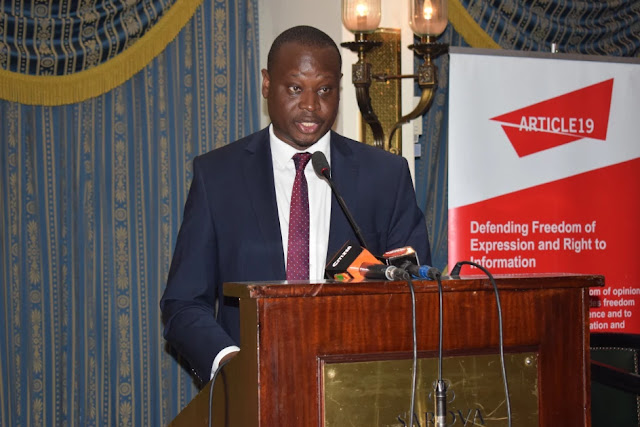Search This Blog
"Truth comes only to conquer those who have lost the art of receiving it as a friend." ~ Ravi Thakur
Featured
- Get link
- X
- Other Apps
Standard Group's Struggle: Unraveling the Woes of Kenya's Media Landscape

KUJ Secretary General Eric Oduor: KUJ has issued a 7-day ultimatum to Standard Group.
In the annals of Kenya's media history, Standard Group stands as a venerable institution, its roots tracing back to the establishment of the Standard newspaper in 1902. However, beneath the façade of tradition and prestige lies a pressing issue that threatens not only the livelihoods of its workers but also the integrity of the country's media landscape. The recent outcry over unpaid wages and labor rights violations at Standard Group has brought to light a systemic problem that demands urgent attention and scrutiny.
Unveiling the Crisis at Standard GroupThe distressing saga unfolding at Standard Group revolves around the fundamental issue of unpaid wages, a grievance that has persisted for months on end. Despite assurances and promises made in consultative meetings, the media conglomerate has failed to fulfill its obligations to its employees, leaving journalists and photographers in dire straits. The Kenya Union of Journalists (KUJ) has sounded the alarm, issuing a seven-day ultimatum to Standard Media Group to rectify the situation or face collective action.
Analyzing the Implications
At its core, the plight of Standard Group's workers reflects broader challenges within Kenya's media industry, with far-reaching implications for both professionals and the public at large. The failure to pay journalists not only violates their rights but also undermines the essential role of the media in society. A media landscape marred by financial instability and labor disputes compromises journalistic integrity, erodes public trust, and threatens the democratic fabric of the nation.
The wider ramifications of Standard Group's woes extend beyond its own walls, casting a shadow over the entire Kenyan media ecosystem. As one of the oldest and most influential media outlets in the country, Standard Group's predicament sets a troubling precedent for other media organizations. The erosion of labor rights and journalistic standards within a prominent institution sends ripples throughout the industry, perpetuating a culture of exploitation and impunity. There's a silent crisis brewing at Standard Group. An anonymous employee has threatened suicide today, Friday 10 November 2023. @StandardGroupLc pay your people! 10 months' bila salary is NOT on! pic.twitter.com/ItMzbgpWer
Navigating the Path Forward
In confronting the crisis at Standard Group, stakeholders must prioritize accountability, transparency, and collective action. The solidarity exhibited by KUJ and other media associations underscores the importance of unity in advocating for the rights of journalists and upholding the principles of press freedom. Beyond immediate measures such as picketing and ultimatums, systemic reforms are needed to address the root causes of labor exploitation and financial instability within the media industry.
The resolution of Standard Group's woes requires a multi-faceted approach that engages stakeholders at all levels, from media owners and government regulators to civil society organizations and the general public. By fostering dialogue, promoting accountability, and enacting meaningful reforms, Kenya can safeguard the integrity of its media landscape and uphold the rights and dignity of its journalists.
The crisis unfolding at Standard Group serves as a stark reminder of the precariousness of Kenya's media ecosystem and the urgent need for reform. As one of the country's oldest and most respected media institutions, Standard Group holds a special responsibility to uphold the highest standards of journalistic integrity and respect for labor rights. By addressing the root causes of the crisis, fostering a culture of transparency and accountability, and prioritizing the well-being of its workers, Standard Group can chart a path towards renewal and regain the trust of both its employees and the public. In doing so, it can reaffirm its role as a guardian of truth, democracy, and social justice in Kenya's ever-evolving media landscape.
- Get link
- X
- Other Apps
Popular Posts

The One On Why Uganda Produces Shitty Ads
- Get link
- X
- Other Apps

Of Australian Bogans Masquerading As Creatives In Nairobi Agencies
- Get link
- X
- Other Apps
Comments
Post a Comment